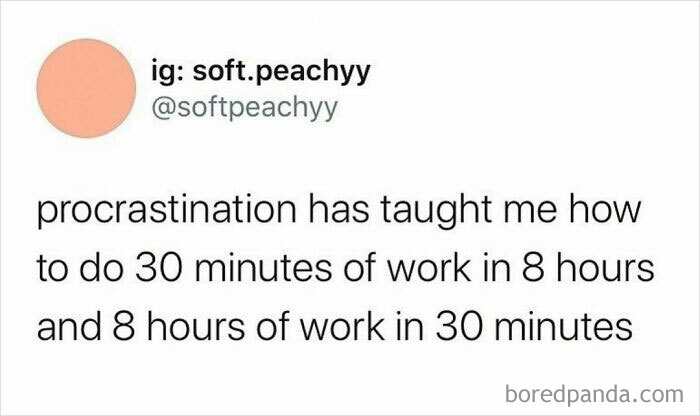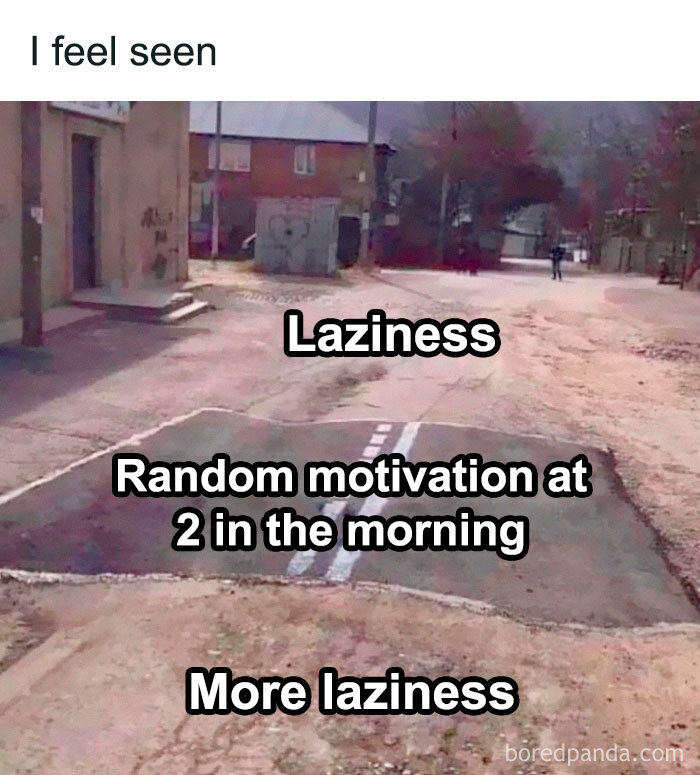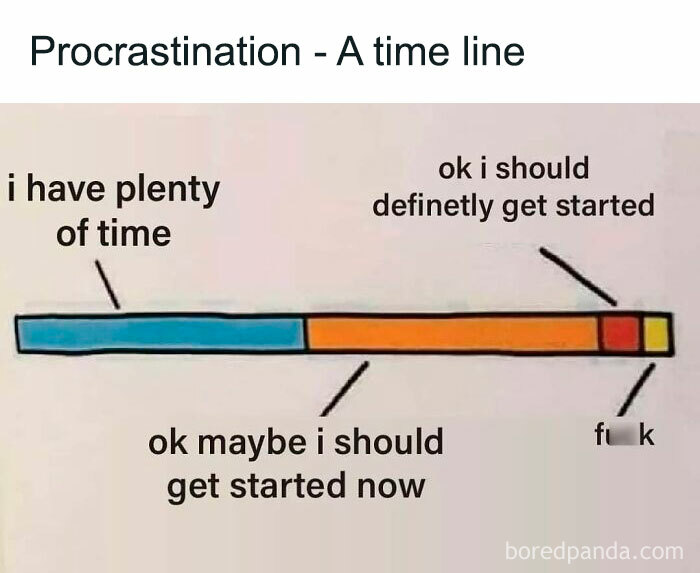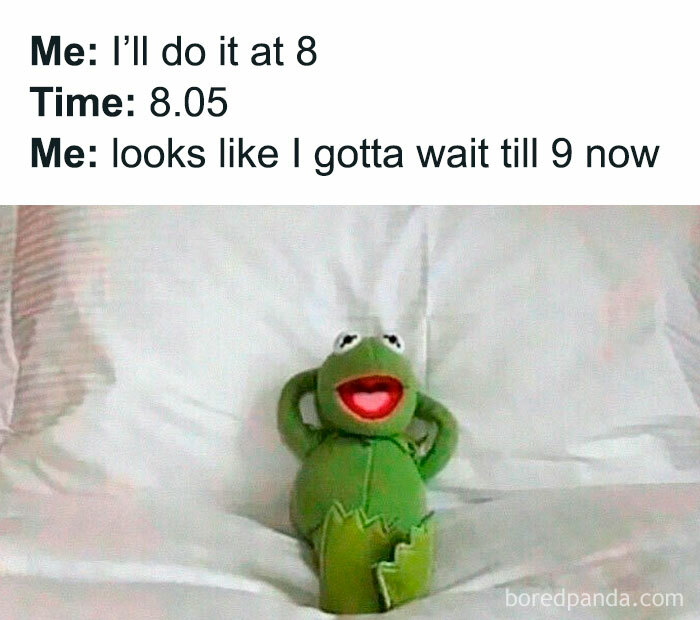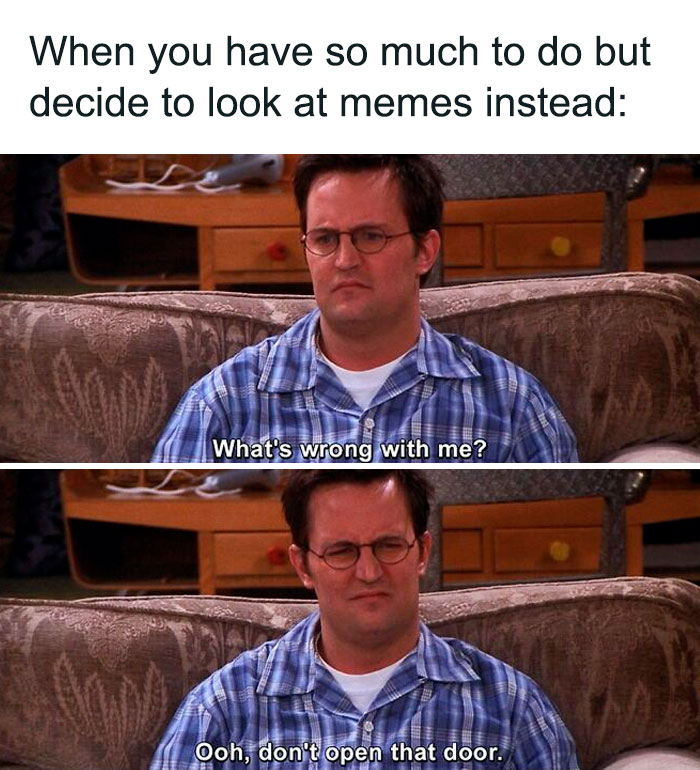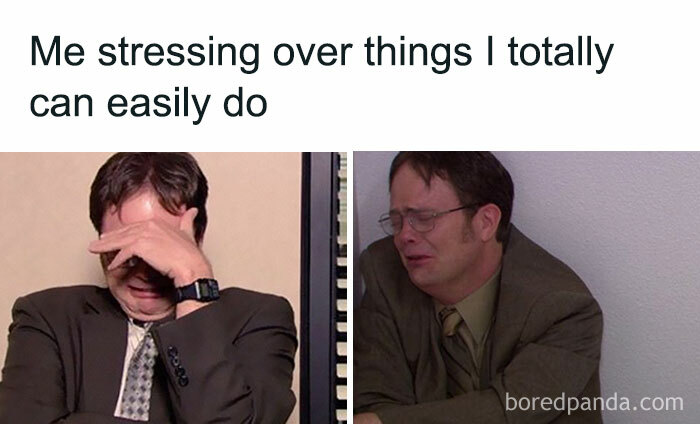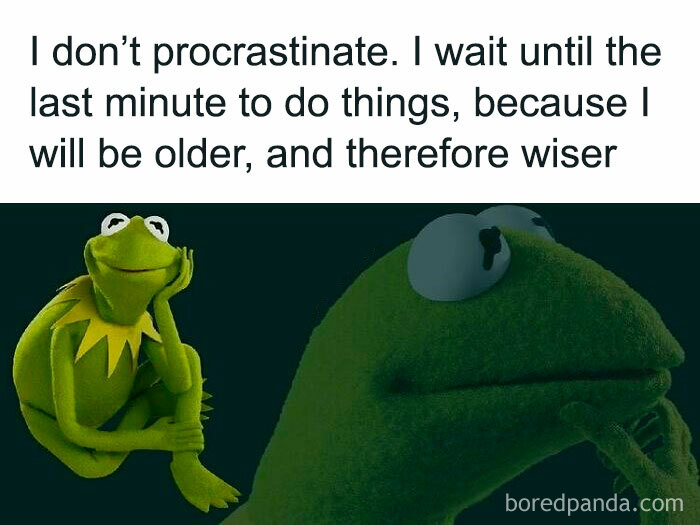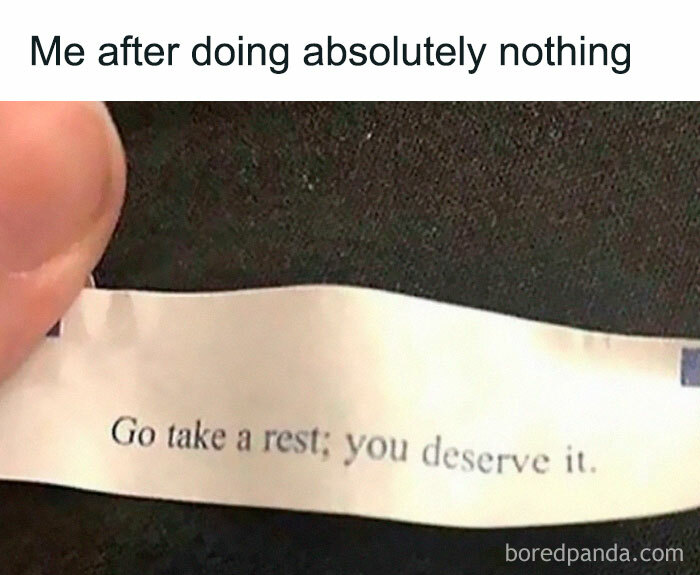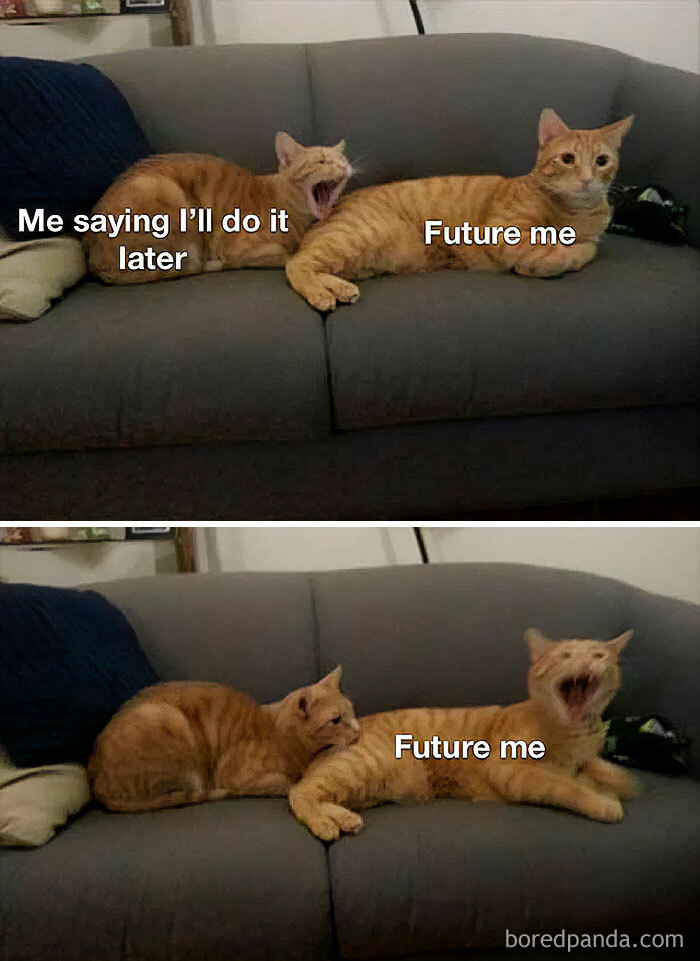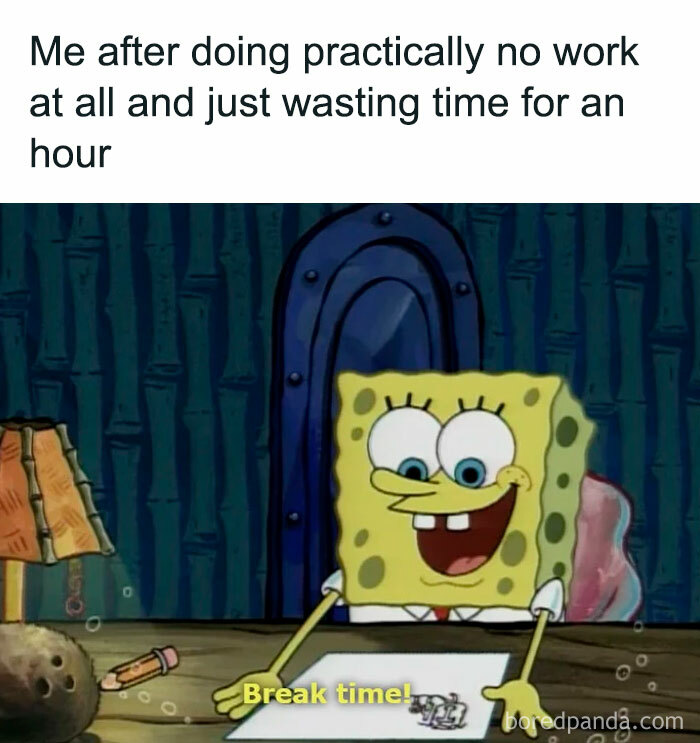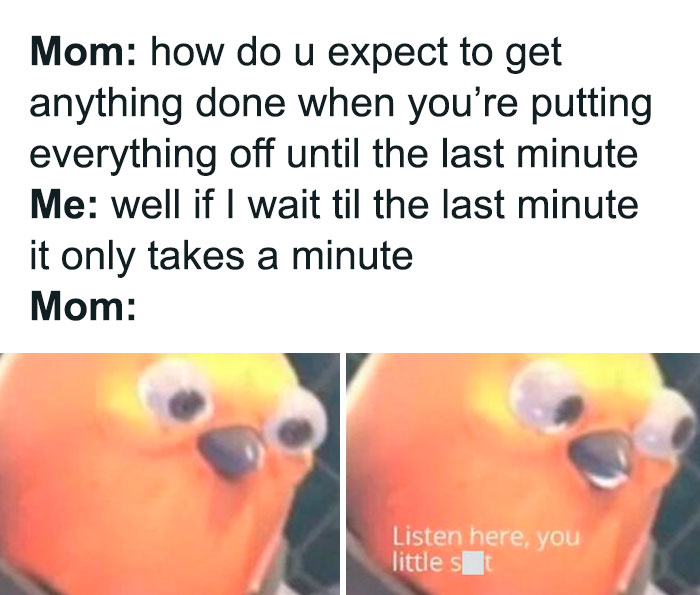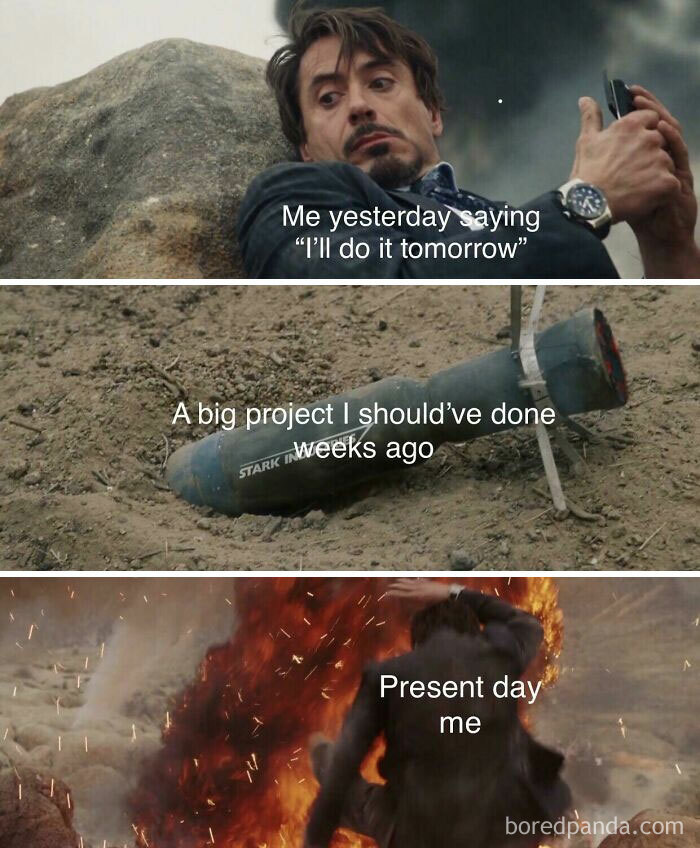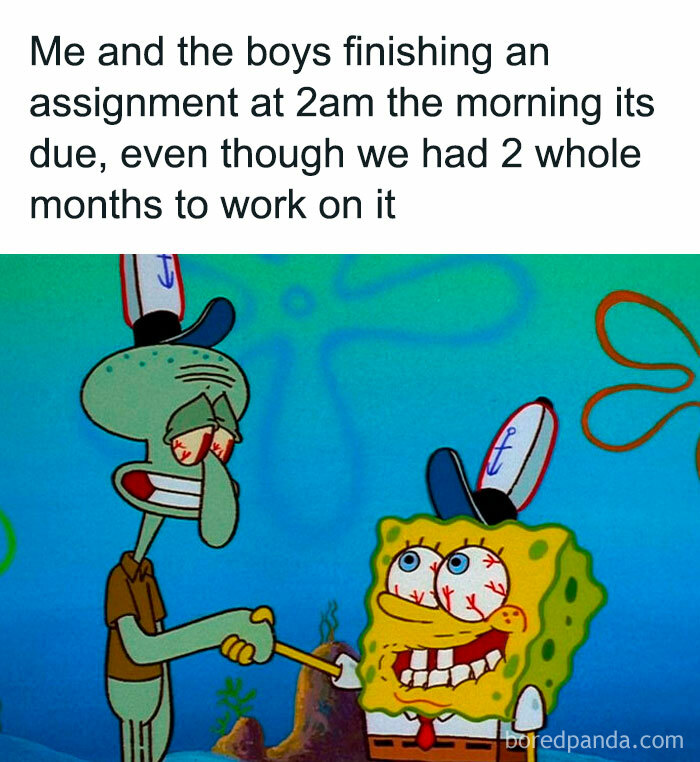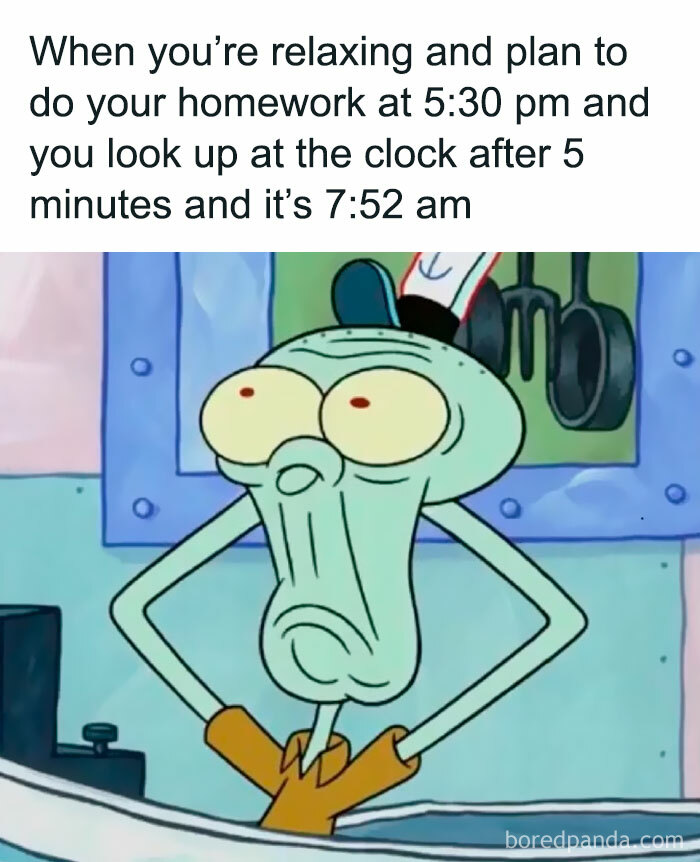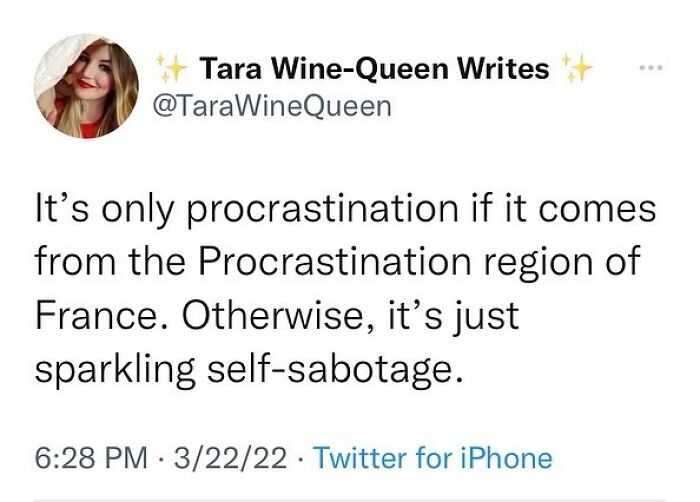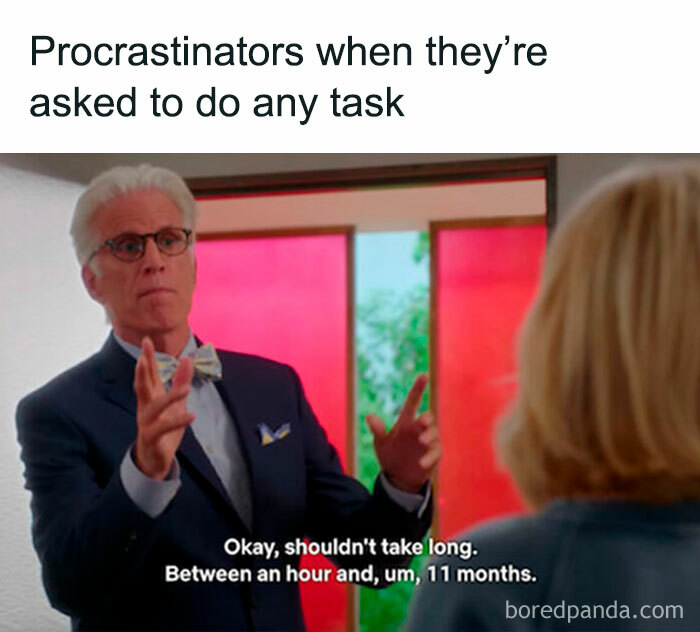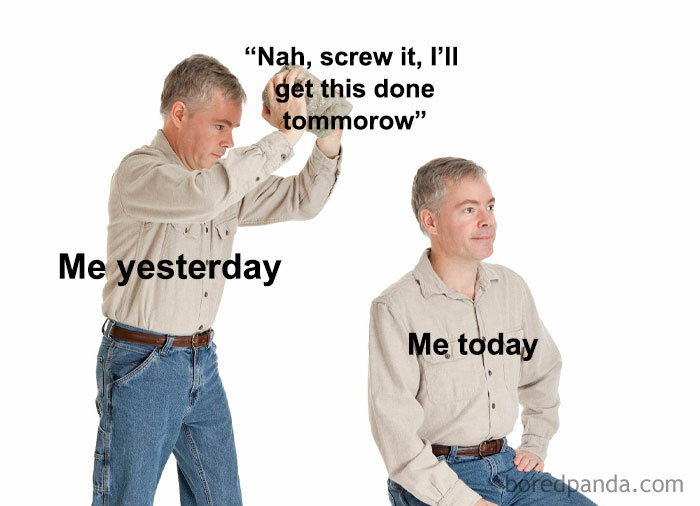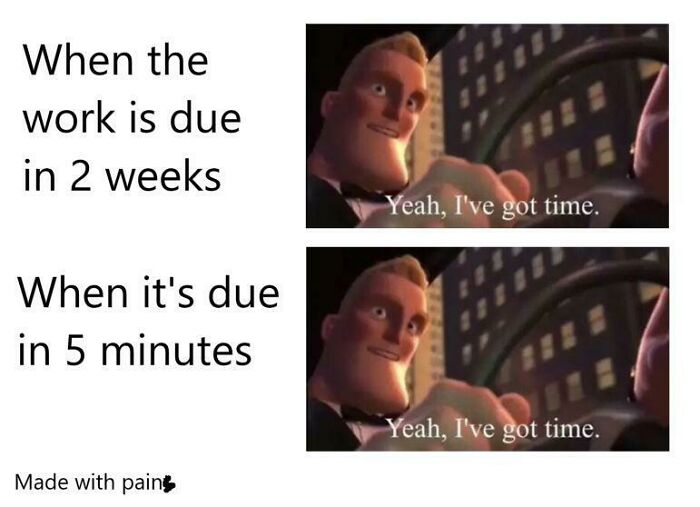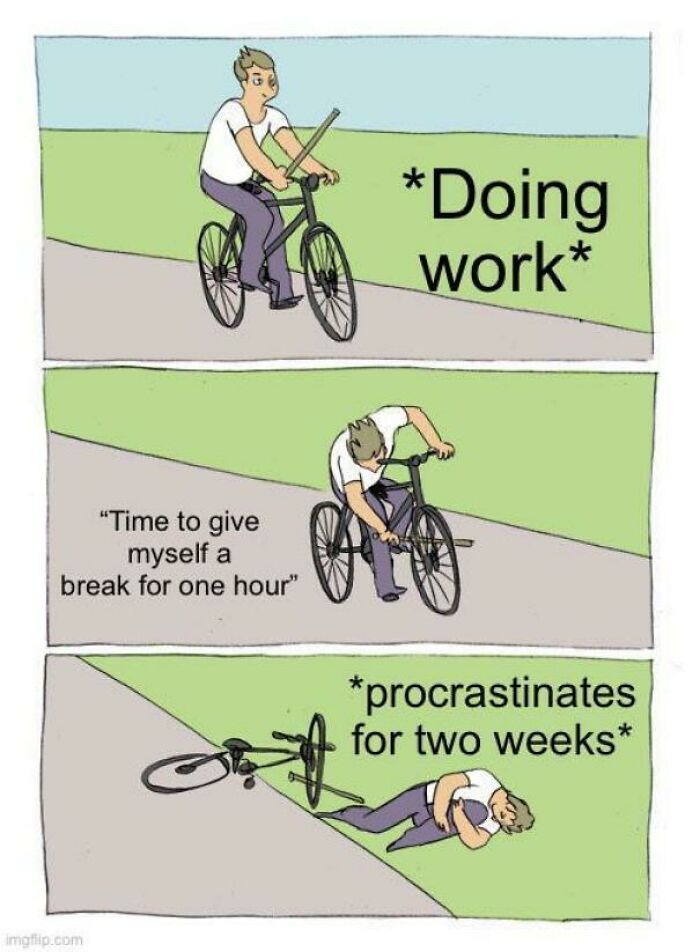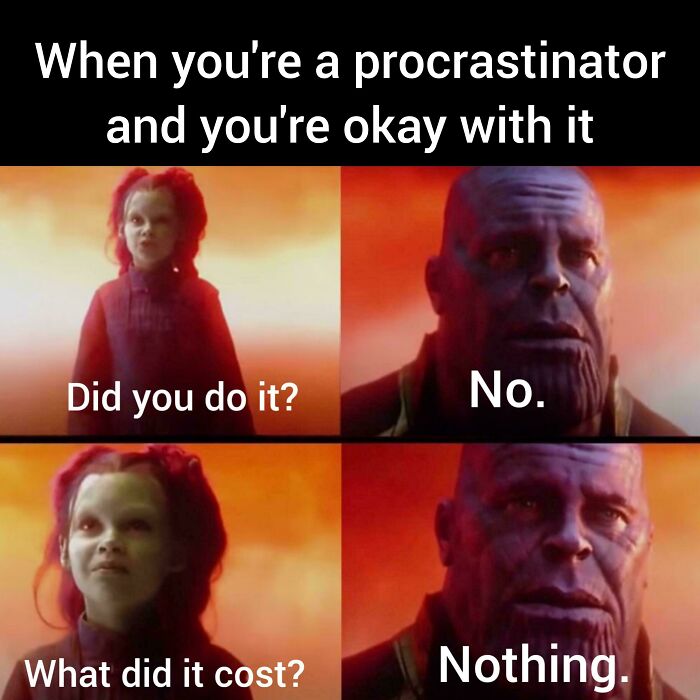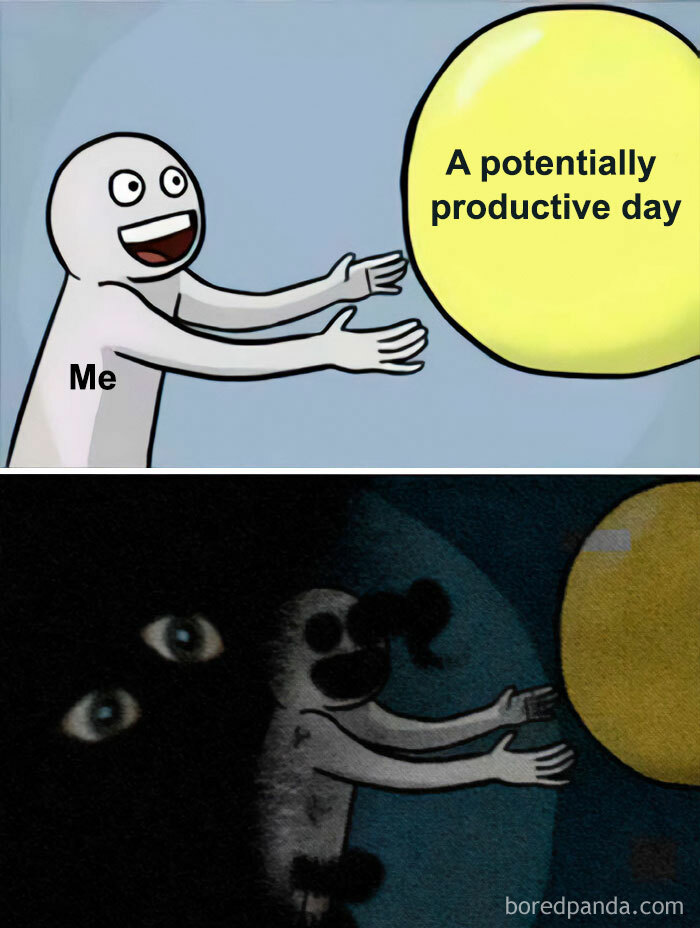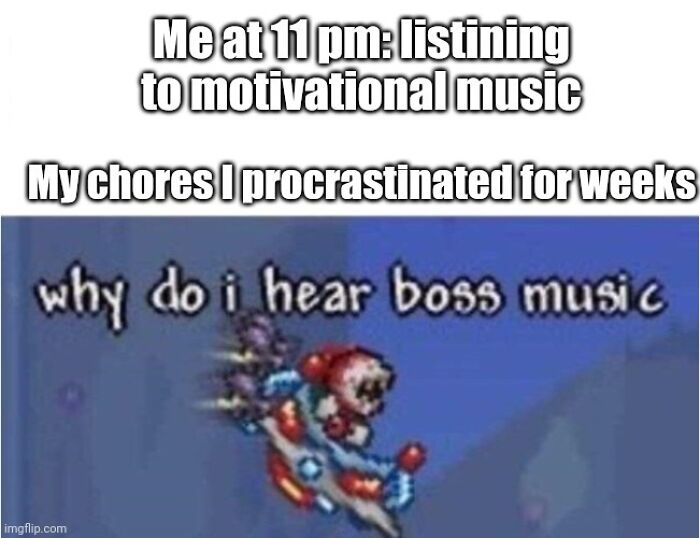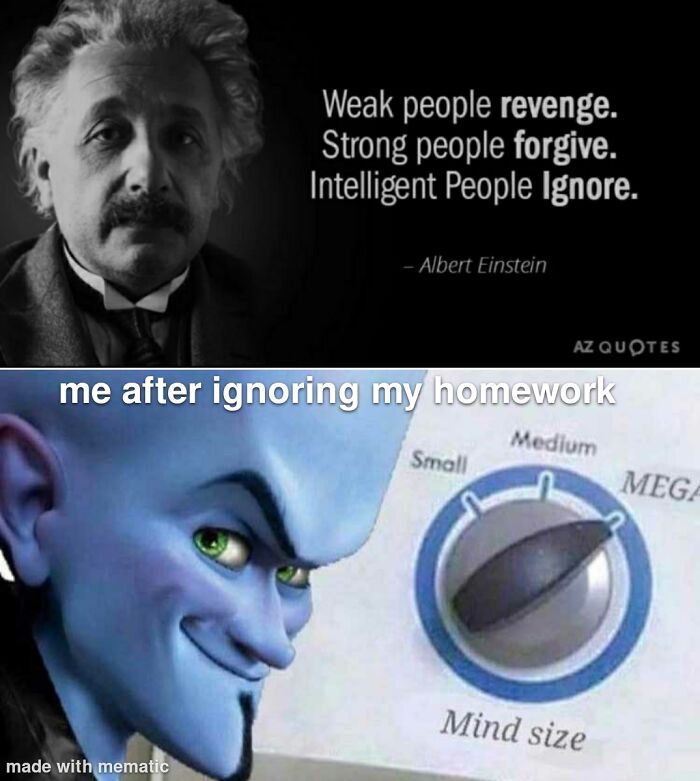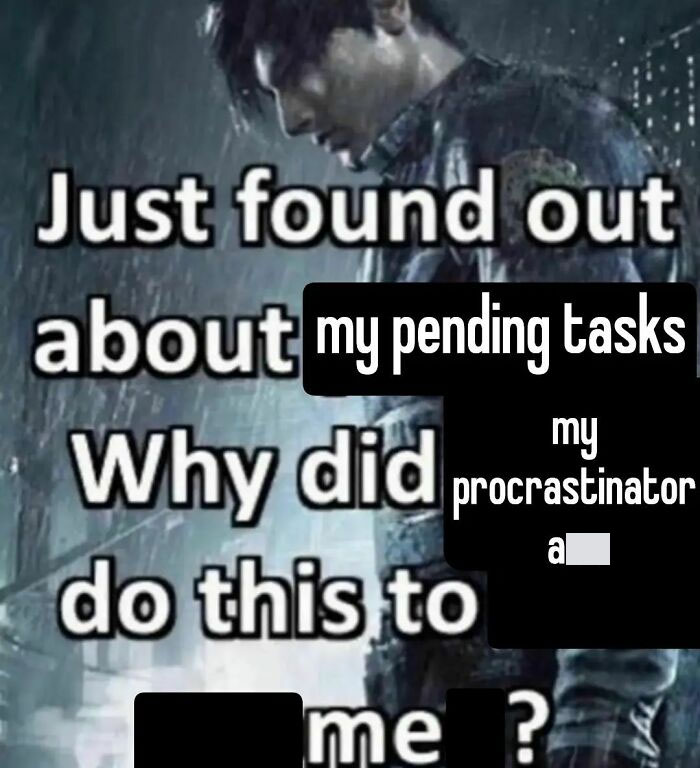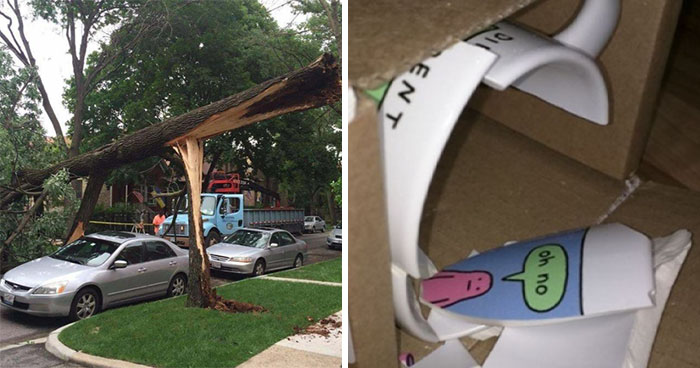
30 Relatable Memes For Those Who Procrastinate Like There’s No End
Interview With ExpertWe all know the looming dread of staring at your to-do list. However, the urge to do literally anything else somehow wins, and you end up scrolling through your phone or manically scrubbing the bathroom for hours. This phenomenon is known as procrastination, and it inconveniently plagues the human population when they least need it.
But if you’re avoiding doing something important right now and have stumbled upon Bored Panda, we aren’t judging you for it. Instead, we provide you with a fresh list of procrastination memes that will have you nodding at their relatability. Scroll down to find them below, and don’t blame us for postponing your tasks for at least another 5 minutes.
While you're avoiding responsibilities, don't forget to check out a conversation we had with personal productivity coach and consultant Ravindra Kondekar from Mumbai, who kindly agreed to give away the secret to avoiding procrastination.
This post may include affiliate links.
Hey, the average procrastinator only takes SEVEN hours!
Studies show that around half of adults procrastinate constantly, with 20.5% seeing it as a daily issue. An average person spends around 218 minutes avoiding doing important tasks, and 41% do so because they don’t feel like it. Meanwhile, a mere 15.6% report never procrastinating.
More interestingly, people between 14 and 29 years old are the most likely to postpone their responsibilities. Regarding gender, men are 17% more likely to procrastinate than women (46%).
Interested in knowing more about why some people procrastinate while others don't, we reached out to personal productivity coach and consultant Ravindra Kondekar.
"David Kahneman's theory in "Thinking, Fast and Slow" helps explain this phenomenon," she told Bored Panda.
"People tend to procrastinate on tasks that require slow, deliberate thinking, as these tasks demand more cognitive effort and willpower. Tasks that are straightforward and require fast thinking are easier to start and complete.
The minority who rarely procrastinate possess the necessary willpower, often driven by intrinsic motivation, and have developed practical strategies to manage demanding tasks effectively, allowing them to stay focused and productive."
When we get stuck in what seems to be a never-ending cycle of procrastination, guilt, and disarray, we might start questioning our laziness or inability to get ourselves in order. But despite these thoughts, laziness usually isn’t the culprit of procrastination.
Instead, "A common reason for procrastination is the feeling of being overwhelmed by urgent tasks, which leads to neglecting more important but less urgent activities," Kondekar says.
"People often engage in busy work, carrying a sense of guilt for not addressing higher-priority tasks. Recognizing this pattern involves reflecting on how one prioritizes tasks and acknowledging when busywork is used as an avoidance strategy."
Why is this so true, I'll never understand why I do this but yet, I can't stop.
Nope... it's like an onion... it's layers... layers of doors... *Eyes water* Sh![] forgot not to breathe in...
According to experts, identifying why you tend to postpone tasks until the last minute and learning how to combat it might be the only way to change such behavior. Psychologist Linda Sapadin sought to help people beat it and wrote a book called “How to Beat Procrastination in the Digital Age.”
In it, she distinguishes 6 styles of procrastination, and once a person knows which of them they are, they can start changing how they think, speak, and act.
One of the types is the perfectionist procrastinator, who is hesitant to start or finish a task because they can’t do anything less than flawless. They often spend so much time paying attention to details that they can’t finish a project.
Another style is the worrier who embraces security, which often causes fear of risk and change. Therefore, they avoid completing tasks so they don’t have to leave their comfort zone and dive into the ‘unknown.’
“The worrier is so anxious they ask themselves ‘what if’ a lot. They’re cautious. Because of that, they’re afraid to step down and actually do what needs to be done,” said Sapadin. “They spend too much time thinking about the anxiety of the piece.”
Both perfectionists and worriers might put off tasks because of a fear of failure or criticism. Therefore, it might be beneficial to challenge these beliefs and recognize that perfection doesn’t really exist.
Experts recommend replacing such standards with more realistic ones while allowing oneself to make mistakes. Avoiding all-or-nothing thinking, giving yourself a time frame to do something, and sticking to it can also help.
Meanwhile, a dreamer is not a fan of details. They have so many ideas of what they want to do but avoid dealing with annoying specifics. “They have thoughts about wonderful things, but somehow the details should just get done or somebody else should do it, so their thinking style is fuzzy, and they end up procrastinating because of that,” says Sapadin.
For this style of delaying, it’s advised to differentiate between dreams and goals and approach the aim with six concrete questions: what, when, where, who, why, and how. Writing out plans into a timeline and going into detail with each step might help stick to deadlines better.
.... even when the other thing is much easier than vacuuming sand in a desert
The crisis makers have convinced themselves that they work best under pressure and are sort of addicted to the adrenaline rush of living on the edge. “So this person waits until the last minute, and often they pull it off, but with a whole lot of angst and generally not as good as it could be, so it’s no way to live life,” said Sapadin.
This style of procrastinator has to find internal motivation to work when there’s no pressure, so they don’t become dependent on deadlines.
No, because if you think about it, tomorrow is an elusive idea that never really comes.
I put Spotify on my TV with lyrics on and pretend I'm a singer in a big concert. Whatever it is I have to do can wait after the gig.
The defier tends to look for ways to break the rules. By procrastinating, they are creating their own schedule and way of doing things, so nobody can control or predict them.
If a person has this mindset, they should find positive ways to feel in control. One way to do so is by trying to work with advisors and authority figures who can help guide them through more conventional processes of working.
I actually have lots of homework that's due next week, yet here I am, scrolling through bored panda memes
Meanwhile, the last type, an overdoer, takes on too many responsibilities, failing to make decisions and prioritize tasks. “The overdoer, on the other hand, you would think would do everything, but they end up actually doing a lot for other people,” said Sapadin. “But what they end up often procrastinating on is what they need to do for themselves. So they get involved in everybody else’s stuff and then, ‘Oh my God my stuff isn’t done.’”
These people need to start saying ‘no’ when it’s necessary and learn to focus on the important tasks first. Introducing time management techniques like the Pomodoro Technique or apps that can break down larger tasks into smaller, not-so-overwhelming chunks.
I learnt Russian verb conjugation after not attending any classes in 10 minutes before the exam. I don't remember it any more though. I wish I had taken the time to learn properly instead of just trying to pass the exam because then I'd probably still know it!
I was always taught to put the date of assignment submission as the date on the assignment/paper.
Feels good enough to take some celebratory time off, thus moving all other tasks further into the future 🥴
good ol' times when I went to school and did exactly this. Or set my alarm clock to 2 am to do homework just to turn off the alarm to go back to sleep again.. I was a very disciplined kid with great ambition /s EDIT: Grammar
I love old movies. The black and white movies have that crackle sound that i just adore
My room was always the cleanest when I had an essay to write or an exam to study for
Boy, I hope the stuff you had to do in 2020 didn't involve going outside...
One time I had 7 months to do a project and waited until the day before it was due
I'll tell you what it's helping me put off later
Load More Replies...One time I had 7 months to do a project and waited until the day before it was due
I'll tell you what it's helping me put off later
Load More Replies...
 Dark Mode
Dark Mode 

 No fees, cancel anytime
No fees, cancel anytime 








